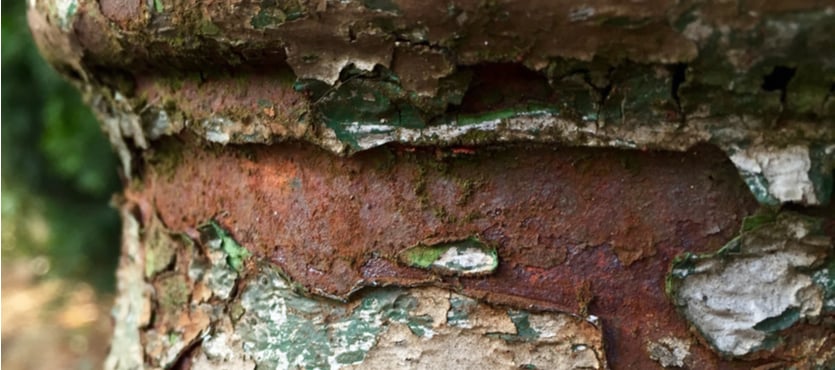Corrosion is a common problem that impacts a lot of different surfaces, from lighting fixtures to street signs. Corrosion can occur in a variety of environments. All it takes is the oxidization of most or all of the atoms on the surface of a metal object. Generally, metals are easy to oxidize, as they tend to lose electrons to oxygen (as well as other influences) that are found in air and water. As the surface losses oxygen, it gains electrons; this is what creates an oxide within the metal.
Certain environments increase risk factors for corrosion, such as coastal locations where there is a lot of moisture in the air. The high salt content in the moisture-rich air further contributes to the risk for corrosion.
Corrosion remains one of the most damaging naturally occurring elements. Ignoring it will only cause the problem to worsen.
What Happens if You Ignore Corrosion?
Corrosion starts off as an eye sore but over time it degrades the structure of the object until it breaks down completely. As metal reacts with substances in the environment it can become unstable. Even the Statue of Liberty has been greatly harmed by corrosion over the years. In fact, the massive iron frame and copper skin worked like the electrodes of a huge galvanic cell. As a result, almost half of the frame rusted away by the statue’s hundredth anniversary in 1986.
When ignored, corrosion presents a serious problem for construction and overall safety. For instance, corroded light poles have fallen over onto cars in recent past.
Types of Corrosion
There are several different types of corrosion: General Attack Corrosion, Localized Corrosion, Environmental Cracking, and Galvanic Corrosion.
General Attack Corrosion is incredibly common and involves the entire surface of a metal structure being attacked. It is created by a chemical or electrochemical reaction. It can cause the metal to fail. Thankfully it is a predictable problem and can therefore be planned for and prevented.
Localized Corrosion is when corrosion only attacks a portion of a metal surface. There are three different kinds:
Pitting: Small holes in the metal surface
Crevice corrosion: Corrosion in stagnant locations
Filiform corrosion: Corrosion that happens as a result of water getting beneath the top coat, such as paint.
Galvanic Corrosion is when two different metals come into contact within a liquid electrolyte such as salt water. When one metal’s molecules are pulled towards the other, corrosion can occur in one of the two metals. This is far more common in electronic components, and not so much an issue with outdoor fixtures.
Environmental Cracking occurs when the conditions are extreme enough to cause cracking or fatigue. The metal may also become brittle and weakened.
Do All Metals Corrode?
Just about any metal has the potential to corrode when exposed to the right elements – which include air and water. Pure iron tends to corrode faster than other metals, while stainless steel, a combination of iron and other alloys, is slower to corrode. That’s why stainless steel is so popular in everything from kitchen appliances to outdoor fixtures. Small groups of metals, which are known as Noble Metals, tend to be less reactive than others. They are less likely to corrode and are the only metals found in nature that are in their pure form. Noble metals tend to hold a lot of value and include silver, platinum, gold, rhodium and palladium.
Corrosion Resistant Products by TerraCast
The best way to prevent corrosion is to invest in products that do not corrode or rust in the first place. Easier said than done considering many of the most commonly used materials are susceptible to rust and corrosion.
At TerraCast, we are dedicated to making products that are resistant to corrosion. Our resin-based products are one-of-a-kind and intended to last a long time no matter what the weather throws your way. Resin is virtually indestructible and will not rust or rot. Learn more about our resin-based products.

